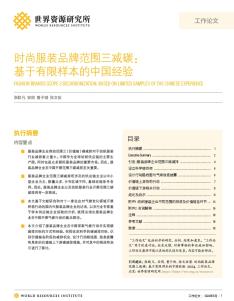FASHION BRANDS SCOPE 3 DECARBONIZATION: BASED ON LIMITED SAMPLES OF THE CHINESE EXPERIENCE
Based on literature review, interviews with 11 domestic and international brands actively combating climate change, and industry experts’ experiences, this paper summarizes the fundamental approaches for fashion brand companies to undertake climate actions in China.

Fashion brands’ Scope 3 (value chain) emissions reduction holds significant importance for the decarbonization of the textile and apparel industry. China is a primary manufacturing hub for the global textile supply chain and a key market for international brands. Therefore, implementing Scope 3 decarbonization in China is vital for fashion brand companies.
Fashion brands face certain challenges in reducing carbon emissions as vast numbers of suppliers involved in fashion brands’ Scope 3 emissions are mainly small and medium-sized enterprises (SMEs) distributed across different regions with varying infrastructures.
Based on literature review, interviews with 11 domestic and international brands actively combating climate change, and industry experts’ experiences, this paper summarizes the fundamental approaches for fashion brand companies to undertake climate actions in China.
This paper outlines methods and experiences of fashion brand companies in China in taking climate actions and achieving carbon emissions reduction targets, including setting science-based targets, identifying emissions reduction opportunities, designing road maps, and undertaking climate information disclosure and specific emissions reduction measures along the value chain, while discussing challenges and insights.